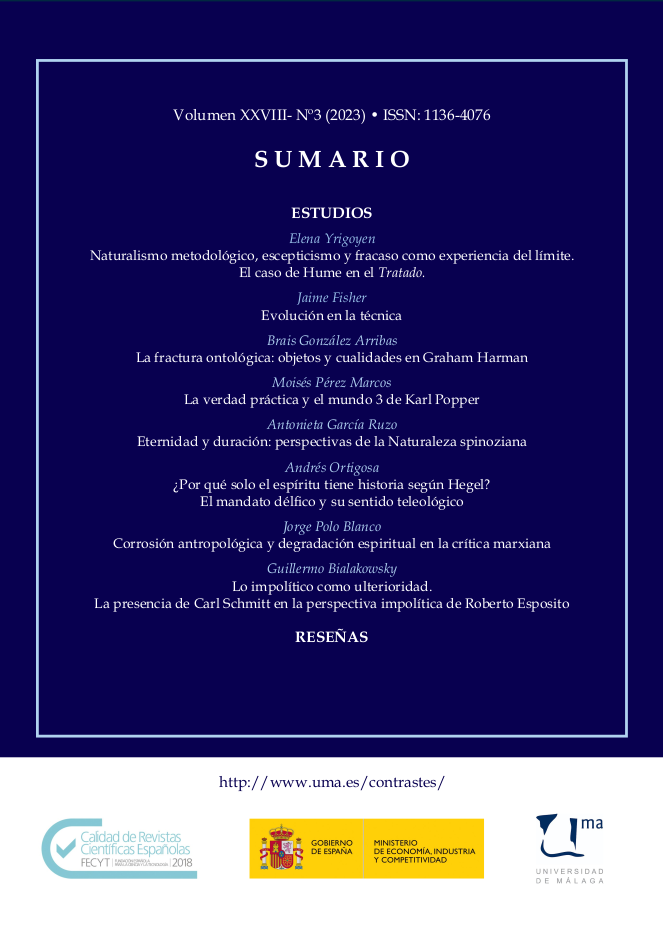Evolución en la técnica
DOI:
https://doi.org/10.24310/Contrastescontrastes.v28i3.15374Keywords:
creativity, invention, innovation, evolution, techniqueAbstract
Reconciling the concepts of creativity, invention, and innovation with that of evolution in thinking about technique leads to an intertwined problem and objection. The problem is that the first three would imply a purpose or intentionality, while the fourth subsumes a blind and purposeless process. Hence the objection to using the Darwinian evolutionary model in the philosophy of technique. This work aims to propose and support the possibility of fruitfully thinking about technical evolution -beyond a mere metaphor-, without disregarding the first three concepts indicated.
Downloads
Metrics
Publication Facts
Reviewer profiles N/A
Author statements
Indexed in
-
—
- Academic society
- N/A
- Publisher
- Universidad de Málaga
References
BALDWIN, J. M. 1896 «A New Factor in Evolution», The American Naturalist, 30, pp. 354-451, y 536-553.
BASALLA, G. 1988: The Evolution of Technology. Cambridge: Cambridge University Press.
BRENTANO, F. 1973 (1874): Psychology from an Empirical Standpoint. London: Routledge and Kegan Paul.
BRONCANO, F. 2000: Mundos Artificiales. México: UNAM-Paidós.
DAMASIO, A. 2005: En busca de Spinoza. Barcelona: Crítica.
DARWIN, C. 2009 (1876): The Origin of Species. Cambridge: Cambridge University Press.
DARWIN, C. 1887: F. Darwin (Ed.), The Life and Letters of Charles Darwin. Including an Autobiographical Chapter. New York: D. Appleton and Co.
DAWKINS, R. 1976: The Selfish Gene. Oxford: Oxford University Press.
DEWEY, J. 1925: Experience and Nature. Chicago: Open Court Publishing Compan.
DIÉGUEZ, A. (2011 b) «El origen evolutivo de la racionalidad humana», en A. R. Pérez, y A. Velasco (Coords.), Racionalidad en ciencia y tecnología. México: UNAM, pp. 179-191.
DOSI, G. 2000: Innovation, Organization and Economic Dynamics. Northampton: Edward Elgar.
EDELMAN, G. 1987: Neural Darwinism. The Theory of Neural Group Selection. New York: Basic Books.
FERRATER, J. 1979: De la materia a la razón. Madrid: Alianza.
HICKMAN, L. (1998) «Four Effects of Technology» Philosophy and Technology, 3, pp, 59-67.
HODGSON G. AND T. KNUDSEN (2006): «Why we need a generalized Darwinism, and why generalized Darwinism is not enough», Journal of Economic Behavior and Organization.
HUME, D. 2009 (1740): A Treatise of Human Nature. The Floating Press.
JABLONKA, E. AND LAMB, M. 2014: Evolution in Four Dimensions. Cambridge: The MIT Press.
LIBET, B. ET AL. (1983): «Time of Conscious Intention to Act in Relation to Onset of Cerebral Activity (Readiness-Potential). The Uncounscious Initiation of a Freely Voluntary Act», Brain, 106, pp. 623-642.
LIBET, B. ET AL. (1999): «Do We Have Free Will? » Journal of Consciousness Studies, (6), pp. 47-57.
OAKLEY, K. (1967): «Skill as a Human Possession», en Ch, Singer, and E. Holmyard , A History of Technology, Vol.1. Oxford University Press, pp. 1-37.
ORTEGA Y GASSET, J. 2015 (1939): Meditación de la técnica. Edición de Antonio Diéguez y Javier Zamora. Madrid: Biblioteca Nueva.
PINCH, T., AND BIJKER, W. (2012): «The Social Costruction of Facts and Artifacts» en Bijker, Hughes and Pinch (2012): The Social Construction of Technological Systems. Cambridge: The MIT Press, pp. 11-44.
POLANYI, M. (1962): «Tacit Knowledge: Its Bearing on Some Problems of Philosophy», Review of Modern Physics, 34 (4, Octubre), pp. 601-616.
QUEENAN, B., RYAN, T. J., GAZZANIGA M., AND GALLISTEL, CH. (2017): «On the research of time past: the hunt for the substrate of memory», Ann N. Y. Acad. Sci. 2017 May; 1396(1): 108–125. doi:10.1111/nyas.13348.
SEARLE J. 2001: Rationality in Action. Cambridge: The MIT Press.
SIMPSON, G (1953): «The Baldwin Effect», Evolution, 7, (2). pp. 110-117.
SMITH, M. R., AND MARX, L. 1994: Does Technology Drive History? Cambridge: The MIT Press.
WATSON, P. 2005: Ideas. A History from Fire to Freud. London: Weidenfeld and Nicolson.
WEGNER, D. 2002: The Illusion of Conscious Will. Cambridge: Bradford Books-MIT Press,
WINNER, L. 1977: Autonomous Technology. Cambridge: MIT Press.
Downloads
Published
How to Cite
Issue
Section
License
This journal provides immediate free access to its content under the principle of making research freely available to the public. All content published in Contrastes. Revista Internacional de Filosofía, are subject to the Creative Commons Attribution-NonCommercial-ShareAlike 4.0 license whose full text can be found at <http://creativecommons.org/licenses/by-nc-sa/4.0>
It is the responsibility of the authors to obtain the necessary permissions of the images that are subject to copyright.
Authors whose contributions are accepted for publication in this journal will retain the non-exclusive right to use their contributions for academic, research and educational purposes, including self-archiving or repository in open access repositories of any kind.
The electronic edition of this magazine is edited by the Editorial Service of the University of Malaga (Uma Editorial), being necessary to cite the origin in any partial or total reproduction.










5.png)
